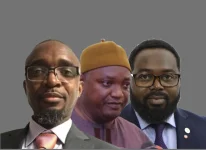Gambians living abroad feel really angry about lawmakers voting against their right to vote in elections. Many see this as a huge betrayal since people outside The Gambia played a major role in helping politicians like Adama Barrow win back in 2016. The money these overseas Gambians send home reached over $775 million US dollars during 2024 alone, which equals about 46.4 billion dalasis and keeps the country going financially. The final count showed 25 legislators against diaspora voting, with just 14 supporting it, prompting some leaders, including Essa Faal from the APP-Sobeyya Alliance, to consider challenging this decision in court.
Momodou Malcolm Jallow, a Swedish lawmaker with Gambian roots, called the vote a complete betrayal of everyone who fought for change nine years ago. He believes letting Gambians abroad vote isn't just legally right but morally necessary. These citizens continue sending money home and supporting their country from afa,r yet can't participate in choosing their leaders. Jallow cannot understand how a government that gained power thanks to diaspora efforts would turn around and block these same supporters from voting in elections. He points out that The Gambia's 1997 Constitution clearly states all citizens can vote regardless of where they live.
The Supreme Court even ruled in 2021 that denying diaspora Gambians voting rights violates the constitution. Despite this clear legal judgment, authorities have done nothing to fix the situation. Jallow emphasizes you simply cannot talk about political change in The Gambia without acknowledging how overseas Gambians helped end Yahya Jammeh's rule. These citizens organized opposition groups, funded Coalition 2016, arranged protests, and brought international attention to problems under Jammeh. Their financial backing and coordination made victory over the former leader possible, according to Jallow.
Overseas Gambians did more than just fund opposition parties; they lobbied international organizations, which helped pressure ECOWAS and other global powers to force Jammeh into exile. Jallow describes these actions as coming from love and sacrifice for their homeland. Yet despite everything they did to create positive change, these same people remain shut out of the voting process. He claims President Barrow fears removal by the very people who helped him gain power, which explains his refusal to step down after a second term and his efforts to prevent diaspora voting in 2026.
Jallow sees obvious hypocrisy from government officials who happily accept money from Gambians abroad but deny them basic voting rights. Human rights activist Pa Samba Jow agrees, calling the vote another insult to the diaspora community. He believes President Barrow deliberately blocks overseas voting because he thinks these citizens would vote against him. Jow dismisses arguments about needing constitutional amendments as false excuses, saying such changes would only matter for National Assembly elections. He finds the betrayal by Barrow particularly shocking since diaspora support made his presidency possible. Jow promises this vote by NPP/NRP/APRC parties will not stop their fight but instead strengthen their determination to secure voting rights.
Momodou Malcolm Jallow, a Swedish lawmaker with Gambian roots, called the vote a complete betrayal of everyone who fought for change nine years ago. He believes letting Gambians abroad vote isn't just legally right but morally necessary. These citizens continue sending money home and supporting their country from afa,r yet can't participate in choosing their leaders. Jallow cannot understand how a government that gained power thanks to diaspora efforts would turn around and block these same supporters from voting in elections. He points out that The Gambia's 1997 Constitution clearly states all citizens can vote regardless of where they live.
The Supreme Court even ruled in 2021 that denying diaspora Gambians voting rights violates the constitution. Despite this clear legal judgment, authorities have done nothing to fix the situation. Jallow emphasizes you simply cannot talk about political change in The Gambia without acknowledging how overseas Gambians helped end Yahya Jammeh's rule. These citizens organized opposition groups, funded Coalition 2016, arranged protests, and brought international attention to problems under Jammeh. Their financial backing and coordination made victory over the former leader possible, according to Jallow.
Overseas Gambians did more than just fund opposition parties; they lobbied international organizations, which helped pressure ECOWAS and other global powers to force Jammeh into exile. Jallow describes these actions as coming from love and sacrifice for their homeland. Yet despite everything they did to create positive change, these same people remain shut out of the voting process. He claims President Barrow fears removal by the very people who helped him gain power, which explains his refusal to step down after a second term and his efforts to prevent diaspora voting in 2026.
Jallow sees obvious hypocrisy from government officials who happily accept money from Gambians abroad but deny them basic voting rights. Human rights activist Pa Samba Jow agrees, calling the vote another insult to the diaspora community. He believes President Barrow deliberately blocks overseas voting because he thinks these citizens would vote against him. Jow dismisses arguments about needing constitutional amendments as false excuses, saying such changes would only matter for National Assembly elections. He finds the betrayal by Barrow particularly shocking since diaspora support made his presidency possible. Jow promises this vote by NPP/NRP/APRC parties will not stop their fight but instead strengthen their determination to secure voting rights.












